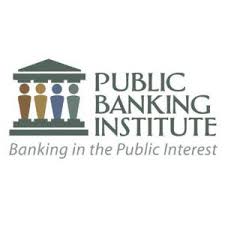Credit To The People
www.credittothepeople.org
info@credittothepeople.org
(413) 329-3200
~ Helping people understand and take responsibility
for using credit and money for the benefit of all ~
Strategies
Our strategies involve:
- helping people understand sovereignty and the need for integration
- helping people understand credit and money
- helping people change the way they think about credit and money, and
- transforming the monetary system.
To transform the monetary system, our strategy is to return credit to the people - on both the national and community level.
To return credit to the people, our members advocate reforming the Federal Reserve System, establishing public banks, and creating community credit and common good communities.
In the meantime, there are numerous ideas and activities in which our members are involved, such as community interdependence funds, non-bank banks, a Citizen's Congress, and socially responsible investing.
The following lists interests and pursuits on the national, regional, local, and legislative levels. It also lists
effective strategies we can implement now.
Also, check out the activities and initiatives our members are taking here.
National:
1. Support the American Monetary Act of the American Monetary Institute, which makes the Fed part of the
Treasury Department.
2. Transform the Federal Reserve:
Either through administrative or legislative processes, we call for a Patriotic Reform of the Fed so that this institution creates only public money, money to be used for the benefit of all the citizens of our country.
Some of the most important effects expected from the implementation of the petition are:
- Increased stability in the monetary system;
- Economic growth set on a just and durable path;
- Disappearance of the need for the public to bail out failed financial institutions.
Explanatory note:
A bit of history: This function of the Fed is prescribed by Art. 1, Sec. 8 of the US Constitution. It recaptures the intent of its constitutive Act of 1913. Limits to the creation of money were not clearly spelled out then. Limits can be clearly spelled out now, as follows:
• Money has to be issued exclusively for the creation of real goods and services, not for the purchase of financial
instruments, consumer goods, or goods to be hoarded;
• Money has to be issued as a loan, not as a grant;
• Loans are to be provided at the cost of their administration, not with interest rates;
• Money has to be created by the Fed for the benefit of the entire population. This goal can be achieved by issuing
loans to public agencies, individual entrepreneurs, cooperatives, and corporations that include an Employee Stock
Ownership Plan (ESOP) in their constitution.
Tactic: Sign the Petition to Reform the Fed.
3. Influence the outcome of Congressional elections with a voluntary Congressional Survey and provide
support for a Citizens' Congress whereby U.S. Representatives both represent and empower the Citizens in their districts.
Tactics:
- Voluntary Congressional Survey
- Citizens Congress http://www.politicalcommunity.us/a-citizens-congress.php
- New Congress Action Center http://peterjamesbearse.wix.com/peoples-congress
4. Advocate for an open Constitutional Convention to rewrite the Constitution so it is properly represented by and representative of We the People.
5. Advocate divesting in fossil fuels.
Tactic: Familiarize yourselves and get involved with 350, a global movement to reduce global warming and face the climate crisis.
6. Advocate for a U.S. Department of Peace.
7. Take other legislative action. (See below.)
Regional:
1. Promote the establishment of Public Banks at the state, county, and city levels.
Tactic: Familiar yourselves with the Public Banking Institute
2. Subscribe to regional co-operative banks.
Local:
Promote the ideas of local alternative currencies, mutual credit systems, Interdependence Funds, local socially responsible mutual funds, business to business barter, cities and towns establishing their own private/public enterprises for social betterment financed by a new municipal bond, and other methods designed to create a socially just and environmentally sustainable economy and society.
1. Promote Mutual Credit:
We instruct people about the process of money creation and promote the idea of creating money for the benefit of the members of our communities through the use of such tools as rCredits, other alternative currencies, and similar experimental approaches.
Tactics:
- Organize and support groups interested in creating mutual credit systems for their communities.
- Make available consulting services and resources.
(Note: CTTP does not intend to create nor administer alternative currencies such as mutual credit systems.)
2. Promote transforming some of the private wealth into money for the common good:
Through such institutions as Local Interdependence Funds (scroll down on the link to Gloucester Interdependence Funds), a common fund, we promote the idea of people transforming part of their private wealth into public money, namely money to be used for the greater benefit of its owners as well as the benefit of all members of the fund and the greater local community. Contributors to the fund would have proportionate ownership share of the fund.
This common fund could be source of money for local private enterprises and local public works.
Tactics:
- Inform local bankers and recommend that they organize a meeting of local bankers to analyze the merits of an Interdependence Fund.
- Communicate the ideals of the Interdependence Fund among all members of the community.
(Note: CTTP does not intend to create nor administer such funds.)
3. Promote the idea that our cities and towns establish their own private/public enterprises for social betterment financed by a new municipal bond that offers a federal income tax deduction in lieu of interest payment.
Legislative:
2. Reform the Federal Reserve (See above); Sign the Petition to Reform the Fed
3. Promote the establishment of Public Banks at the state, county, and city levels. Go to: Public Banking Institute
4. Overturn Citizens United and move to amend our Constitution to firmly establish that money is not speech, and only natural persons are entitled to contribute to political campaigns.
The following efforts are about transforming democracy so that we can actually govern our sovereignty:
- Free Speech for People www.freespeechforpeople.org
- Move To Amend (federal, via Congress) https://movetoamend.org
- Pass Mass Amendment (state, direct via petition) http://www.PassMassAmendment.org
- Wolf-Pac http://www.wolf-pac.com
5. Overturn the McCutcheon v. FEC decision, which would lift limits on how much individuals can give to candidates every election cycle.
6. Support The Government By the People Act (HR 20) and the Fair Elections Now Act (S 2023) - to help fix our election laws and help boost the influence of grassroots donors so that we can all play a central role in determining who runs for Congress, who wins elections, and what makes it onto the agenda in Washington, and ensure that we can continue to have a government that is representative of all its citizens, not just the wealthiest 1%.
7. Support Larry Lessig's MayDay PAC and help make campaign finance reform an issue in the 2014 elections.
8. Reinstate the Glass–Steagall Act to limit commercial bank securities activities and affiliations between commercial banks and securities firms.
9. Overhaul the Dodd Frank Act and the Bankruptcy Reform Act.
10. Support "Audit the Fed" Bill. http://www.thenewamerican.com/usnews/congress/item/18220-bipartisan-majority-of-house-supports-audit-the-fed-bill
11. Advocate for a carbon tax. Support the green-industrial effort by eliminating subsidies for carbon fuels and putting a price on greenhouse gas emissions. A carbon tax would be a simple, efficient, blunt force instrument to catalyze a shift from the fossil fuel world to the Solar Age.
12. Advocate to stop subsidies to carbon fuel companies.
13. Modernize security laws to allow investors to invest in locally-owned businesses and allow for the creation of local investment funds.
14. Advocate for the ban of high-frequency trading http://en.wikipedia.org/wiki/High-frequency_trading
15. Advocate for a Foreclosure Moratorium; Prevent illegal bank foreclosures.
Check out Mass Alliance Against Predatory Lending – MAAPL http://maapl.info
16. Establish mediation between bankers and homeowners prior to foreclosure as an intermediate step.
17. Revise trade agreements to affirm the responsibility of every nation to contribute to global economic security and stability by organizing for sustainable self-reliance in food and energy and managing its economy to keep imports and exports in balance.
18. Advocate for a Debt Jubilee. Support debt forgiveness through Jubilee Acts. Check out: http://strikedebt.org
19. Support other people’s local economies by urging representatives in Congress to cancel debts of poor countries. See www.jubileeusa.org
Strategies We Can Implement Now:
1. Vote with our dollars; Make more environmentally and socially conscious purchases.
2. Invest in Socially Responsible Investments (SRI) concerned with the environment, social justice, and corporate governance - as in “environmental social governance” (ESG). For more information, go here.
3. Engage in more proactive practices of socially responsible investing, such as impact investing, shareholder advocacy and activism, and community investing.
4. Start a Common Good Community where you are.
5. Use alternative currencies.
6. Get involved in Crowd Funding
7. Divest from a portfolio investments that are unethical, morally ambiguous, and/or toxic.
8. Move our money and any credit cards into local, community development banking institutions, cooperative banks, Credit Unions, or institutions that support sustainable business. To learn more about how to do this, check out www.breakupwithyourmegabank.org.
9. Get involved in the growing global movement against debt and austerity. See http://strikedebt.org.
10. Invest in oneself:
Examples:
- Pay off debts and try life without credit cards.
- Be more efficient regarding our households (e.g., energy efficient homes; have our homes be based on production vs. consumption, pay for themselves, and produce well-being; downsize our homes; shrink our mortgages.)
- Grow our own foods and buy locally.
- Fix and recycle items vs. buy new.
- Participate in the barter economy.
- Read Your Money or Your Life, by Vicki Robin and Joe Dominguez
- Engage in holistic planning.
Note: Credit to The People does not provide financial products, financial services, nor financial advice.
Methodology
Mission: Credit to the People is an educational membership organization committed to a comprehensive understanding of credit and money. It is our further objective to facilitate the emergence of that understanding so that people take responsibility for using credit and money for the common good and benefit of all. We aim to create a healthy and thriving society out of our ongoing understanding of credit and money.
We aim to achieve our mission by:
- promoting the understanding:
• What is money
• How is money created
• How can money be used to benefit all
(See John Root, Jr.’s article “Understanding Money”)
- promoting the various strategies listed above, particularly the idea of alternative currencies, mutual credit systems, Interdependence Funds, and other methods designed to create a socially just and environmentally sustainable economy and society.
- pursuing legislative actions (e.g., Reform the Fed, Overturn Citizens United)
- Using the Sociocratic method of self-governance.
(Note: CTTP does not provide financial products, financial services, nor financial advice.)
Our Tools
Website
Disseminating information
Building alliances
Getting Big Money Out of our Elections via Massachusetts Ballot/Legislative Action
Promoting a petition to Reform the Fed
A voluntary Congressional Survey
Professional resources
The information provided is for educational purposes only. It is general in nature and is not intended as financial advice.
Read about the
transformational process of caterpillar into butterfly;
"Cultural Creatives":





